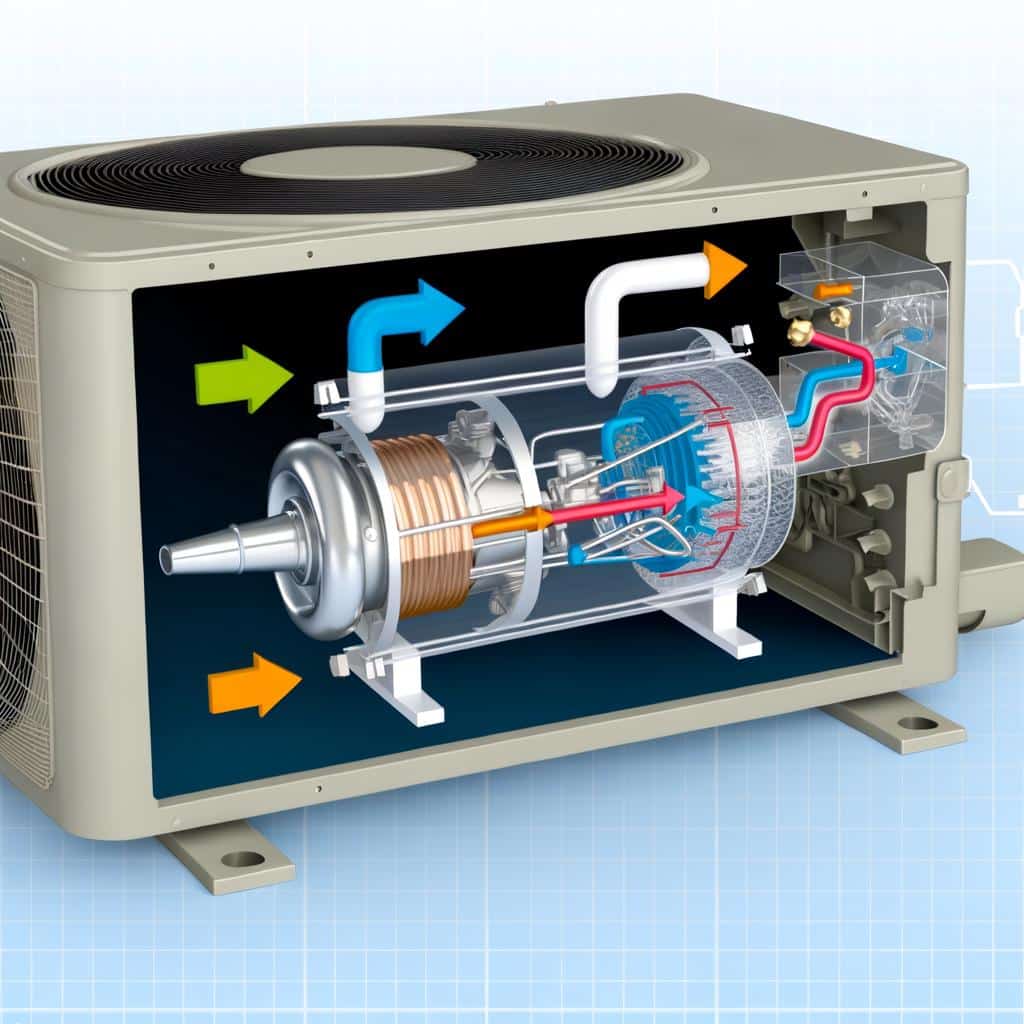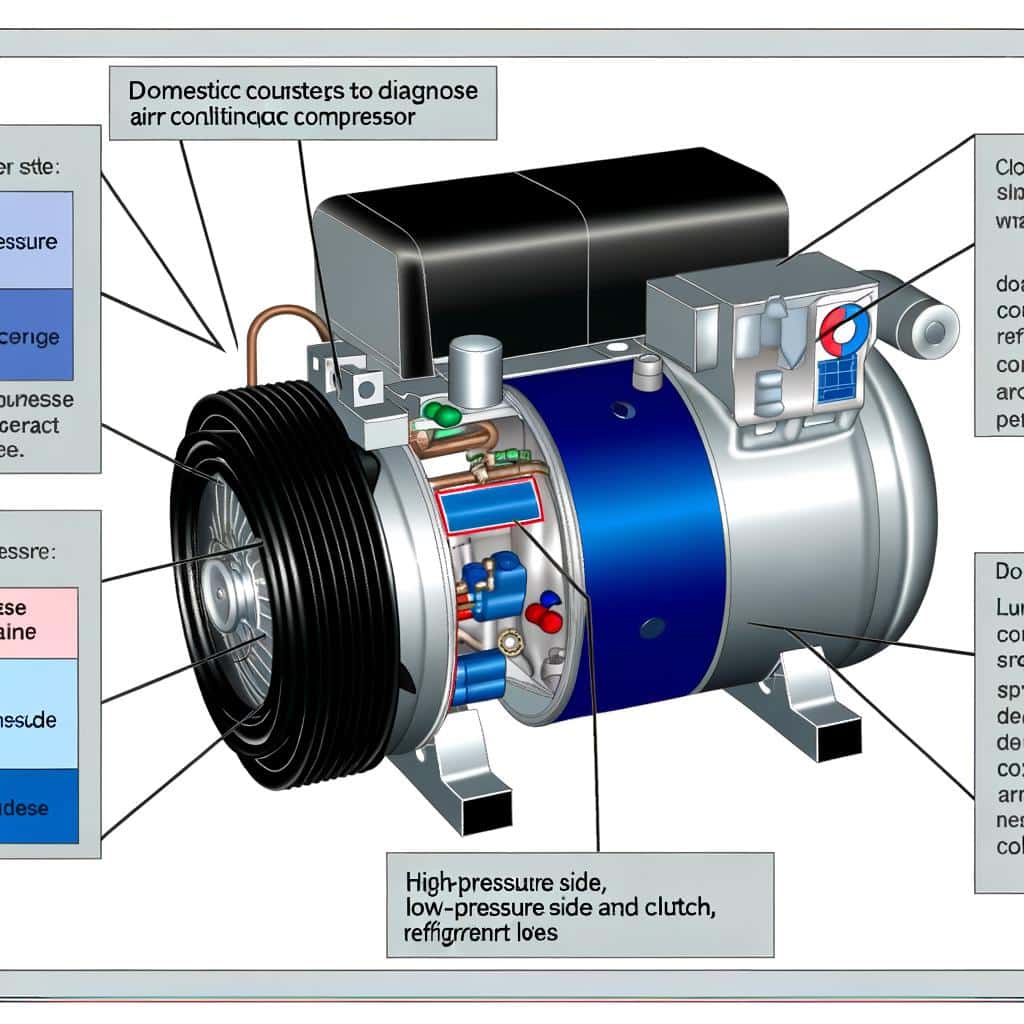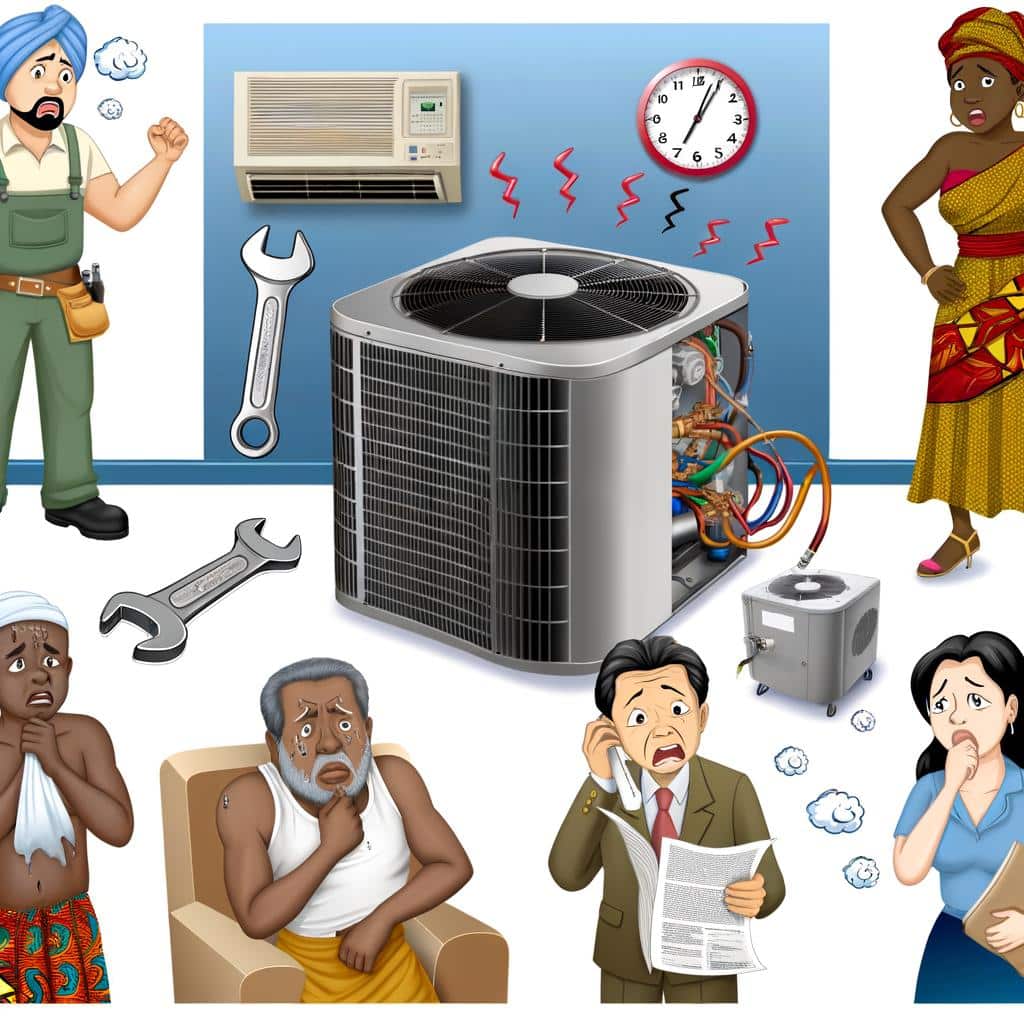As the unsung hero of summer, your air conditioning unit is a lifeline, a comfort bubble, a cool breath of sanity in the brutal, fiery grasp of July. But what happens when that breath of fresh air feels less like a refreshing breeze and more like a weak sigh of defeat? Chances are, the culprit might be lurking in an essential component that you may not even have heard about – the compressor. Plunge into the intricate world of AC mechanics with us as we dissect the issue of bad compressors and explore the signs, symptoms, and solutions. This is your crash course on AC compressors; a comprehensive lowdown that promises to turn you into a better-informed consumer, an amateur expert, a warrior armed for the ultimate showdown – surviving the heat. Welcome to your initiation. We’re about to lift off!
Unraveling the Mystery of an AC Unit
If you’ve ever found yourself scratching your head in confusion over your AC unit’s shenanigans, fear not, for you are not alone. One of the most frequent culprits behind a malfunctioning AC unit is a bad compressor. But what exactly is a compressor and what makes it go bad? Let’s take a quick dive into the topic. The compressor is essentially the heart of your air conditioning system. It’s the component responsible for circulating the refrigerant necessary for heat exchange within the coils of the AC unit. A bad compressor, therefore, can cause your system to lose its cool—quite literally! Common signs of a failing compressor often include:
- Diminished cooling capacities: If your AC isn’t cooling your space effectively despite being at the right setting, a failing compressor might be the problem.
- Noise: Loud or unusual noises from your unit can indicate a malfunctioning compressor.
- High energy bills: A faulty compressor can make the whole unit work harder, thereby consuming more power and ultimately driving up your bills.
Unfortunately, there can be numerous reasons why a compressor goes bad:
| Causes | Consequences |
|---|---|
| Electrical problems | Surges and breakdowns |
| Incorrect suction lines | Reduced system efficiency and increased wear and tear |
| Lack of lubricant | Overheating and eventual failure |
Understanding your AC unit better can empower you to spot signs of trouble early and potentially save you from costly repairs or replacement. However, self-diagnosis should never replace professional inspection and maintenance. Regular maintenance check-ups are essential to ensure a long and chill life for your AC!
Decoding the Role of the Compressor in Your AC
Many people rely on their AC systems to get them through the hot and sweltering months. But often, we fail to appreciate the complexity of these devices and how intrinsic components like the compressor contribute to their overall functionality. In simple terms, the compressor is the core of your air conditioning system, the “heart” if you will, responsible for circulating the refrigerant necessary for heat exchange. Understanding the operation of the compressor isn’t a challenge if you think of it in terms of a human circulatory system. The way your heart circulates blood throughout your body, the AC compressor circulates refrigerant through your air conditioning system. Over time, like any other mechanical part, the compressor may fail or start malfunctioning.
- Motor Failure: If the motor of your compressor fails, your AC unit will not cool the air efficiently. This is one of the most costly air conditioning repair issues, but unfortunately, it’s also one of the most common.
- Capacitor Failure: Your compressor has start and run capacitors which also can fail. Consequently, your AC may not run or may not function efficiently.
- Refrigerant Leaks: Sometimes, you may find that your compressor is working harder than it needs to as a result of a refrigerant leak. This makes your system inefficient and increases your power bills.
Familiarizing yourself with these typical issues will help you identify signs of potential compressor failure early, allowing you to seek professional help before the problem escalates. Here’s a useful table for highlighting some key signs:
| Signature | Potential Issue |
|---|---|
| Loud or Unusual Noises | Possible Motor Failure |
| AC not blowing cold air | Possible Capacitor/Refrigerant Issue |
| Elevated Electricity Bills | Possible Refrigerant Leaks |
Remember, the AC compressor plays a vital role in cooling your home or office. It’s crucial to keep it functioning correctly to ensure optimal cooling and avoid hefty repair costs.
Diving Deep: How to Tell if Your AC Compressor is Bad
If your air conditioning system starts misbehaving, it might often be due to a failing AC compressor. However, as one of the most vital components of your AC, an ill-performing compressor can’t simply be neglected. In fact, if you wish to beat the heat, it is absolutely mandatory to understand how to diagnose a bad AC compressor. Learning to catch the warning signs early can save you from potential discomfort and unnecessary expenses. Your AC compressor can show various symptoms when something’s up. For instance, you might notice the coldest of your air isn’t as chilly as it used to be or the AC is noticeably noisier. In more severe cases, your circuit breaker could trip when the AC turns on. Another red flag could be the AC unit vibrating excessively when the compressor kicks in.
| Symptom | What it means |
| Poor cooling performance | Compressor may not be pumping refrigerant properly |
| Noise | Internal damage to the compressor or mechanical failure |
| Tripped breaker | Compressor overloads the circuit |
| Excessive vibration | Mechanical failure or worn-out compressor mounts |
Remember that regular maintenance of your AC system can help prevent compressor issues. As a homeowner, you should aim to have an HVAC professional inspect and service your AC unit annually. By catching any potential issues early, you can save yourself from a hot, uncomfortable home and a costly repair or replacement.
Understanding the Consequences of a Bad AC Compressor
Renowned as the heart of your AC system, the compressor’s role is both critical and dynamic. Essentially, it’s there to convert refrigerant gas into a high-pressure, high-temperature state before it gets sent off to the condenser. But what happens when things go awry? Well, a faulty or bad AC compressor triggers a cascade of frustrating issues that not only compromise the comfort level in your house but could also lead to potentially exorbitant repair expenses. Reduced Cooling Performance: It should be no surprise that the primary symptom of a bad AC compressor is its significant drop in cooling effectiveness. The unit may still blow air, but you may start noticing it’s not as cold as it used to be. In this scenario, it feels like your system is continually battling to maintain the desired temperature in your home, thus resulting in increased energy usage. This can be seen vividly in your skyrocketing energy bills.
Unusual Noises
: When the component of your AC system suffers wear and tear, it’s likely to produce odd sounds. When a compressor is going bad, you may hear buzzing, rattling, or humming noises whenever the AC is running. This signifies trouble and shouldn’t be ignored.
| Symptoms | Possibly Indicates |
|---|---|
| Reduced Cooling | Damaged or Failing Compressor |
| Increased Energy Bills | Overworked AC unit due to Compressor Issue |
| Odd Noises | Worn Out AC Compressor |
Then there are other sinister fallouts of a failing compressor, such as liquid and refrigerant leaks, overheating issues, and even a complete shutdown of your AC system. Thus, it’s crucial to be aware of these symptoms to respond promptly by calling in a professional for diagnosis and repair.
Offering Solace: How To Deal With A Faulty AC Compressor
Slipping into a home that’s perfectly cooled during a hot summer’s day is one of life’s little pleasures. But what happens when your AC unit begins to falter and the culprit is a faulty compressor? This is a problem faced by many, and if you’ve found yourself in this predicament, you’re not alone.
Understanding what an AC compressor does and the signs of a bad one can prevent a complete system failure. The AC compressor circulates refrigerant throughout the system, absorbs heat and moisture from the air in your home, and ultimately brings cool air in. Common indications of malfunctioning may include loud noises during operation, warmer air than usual, and unresponsive thermostat.
- Loud noises: When compressors go bad, they’ll often make loud clunking, rattling, or banging noises during operation.
- Warmer air: If you’ve noticed that the air blowing out of your vents isn’t as cool as it should be, it might be a sign of a faulty compressor.
- Unresponsive thermostat: If no matter how much you fiddle with the thermostat, the temperature doesn’t seem to respond, your compressor might be to blame.
| Symptom | Possible Cause |
|---|---|
| Loud Noises | Bad Compressor |
| Warmer Air | Insufficient Refrigerant or Faulty Compressor |
| Unresponsive Thermostat | Compressor Issues, Bad Thermostat Wiring |
Examining these red flags early on can save you from the expense and inconvenience of a full system breakdown. However, addressing compressor issues should be left to the professionals to avoid creating more serious problems. Remember that while a faulty compressor is inconvenient, it’s not insurmountable with the right help.

Empowering Yourself: Finding Reliable AC Compressor Repair Services
Dealing with a faulty AC compressor can be quite a bummer, especially during the hot summer months. But empower yourself with the knowledge about what’s happening, why, and more importantly, how to find the best repair services and you can avoid getting stuck in the heat. To ensure you’re getting a reliable repair service, consider these keys:
- Experience: How many years has the company been in the AC compressor repair service? Check their background and ask for client testimonials. The more experienced, the better.
- Trained Technicians: It’s essential that the technicians in the company are well trained and hold certifications. This is a sign of credibility and skill.
- Prices: Be wary of companies providing services at cost that seem to be too good to be true. High-quality repair work comes with a price. However, it doesn’t mean you have to break your bank.
- Availability: A good repair service will be able to attend to your needs whenever required and will not leave you stranded.
Understanding the causes and symptoms of a bad compressor might also steer you towards the right repair solution. Quite often, a failing compressor manifests signs like:
| Signs | Description |
|---|---|
| AC blowing hot air | Your AC was meant to deliver a chill, not a heatwave. If it’s doing the opposite, your compressor could be failing. |
| AC frequent cycles | It’s natural for your AC to cycle on and off. But if it’s happening too frequently, then it may be time to check the compressor. |
| Leaking moisture | Small amounts of condensation are normal. But if you see large pools of water or refregerant leaks around your AC, the compressor may be the problem. |
| Strange noises | If you’re hearing grinding, squealing, or chattering noises from your AC, the compressor may be developing a fault. |
Don’t let yourself be left sweating and uncomfortable in a sweltering room. Empower yourself with the right knowledge and make the best decision for your cool comfort. In the rhythm of daily routines, amidst the hum and hustle of life, stands a silent sentinel—your Air Conditioner. It goes on unblinking and unsleeping, steadfast in its duty to keep you cool. The heart of this guardian? Your AC compressor. Nevertheless, like all hearts, it too can falter and fade. Knowing and understanding this crucial component, can often be the difference between a quick fix and a looming AC catastrophe. Now that we’ve let you in on the secrets of ailing compressors hopefully, you’ll have a cooler perspective on your summer chill. Stay cool, stay informed, and when in doubt, always consult a trusted HVAC specialist. Remember, a healthy compressor implies a happy home.




